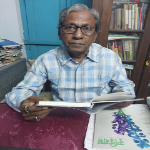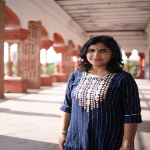TRANSLATED FROM THE BENGALI BY PRITHA BANERJEE
Served on a four-seater table, Pritimoy has had one or two mouthfuls of rice from his plate. Settling her eyes on the chair kept on the left side, his wife Minu says, “Look how joyfully children relish their rice today.”
His palate is clean after he gulped down the rice, hissix-year old daughter by his side and the four-year-old son by his mother on the chair. Casting a quick glance at them, he proclaims, “Is it for no reason that in the past months I bought the expensive Chamormoni rice, fifty nine rupees per kilo, the thin and fine variant, rather than the forty-four rupees Desi Minikit?”
Minu’s headful of curls suffuse in a loosening sort of beauty and . She shrugs both her shoulders and replies, “Uh! As if you have bought the expensive Bansh Kathi or Basmati!? This after days of nagging till my mouth frothed …”
Minu’s voice does not sound too pleasant to Pritimoy. He keeps stirring the rice with his fingers and immerses in deep thought, “Is this rice not enough to satiate the kids… or Minu…! Do all of Minu’s relatives fill their stomachs daily with these varieties of rice, or is it that they have been doing so for years? Once upon a time we … even though we weren’t displaced by the Partition, but those disastrous calamities, amidst the heavy floods, we had to leave our village, our native home, to live in a completely different Police area. During those days when cordons were prevalent, the transfer of rice from one police area to another would be strictly monitored by the Police … in those times, hasn’t it ever been that Minu’s family was served rice from the ration shops, laden with coarse gravel…!
After Partition, during her tender adolescent years, didn’t her paternal family leave everything in their native land, only to move into Cooper’s Camp? Does she live in denial, or does she wish to forget that episode…? Or, is it that she wishes to erase the memory…!”
The thin bone of the fish is stuck between Pritimoy’s teeth. The tip of his tongue reaches out to it briefly but returns a failure. Even after attempting to handle it a couple of times with his unwashed fingers, he fails to pull it out. The blades of the ceiling fan over his head pull in the hot air and make the room windy. He gets irked in these vein attempts at trying to pull the bone out of his teeth. Just then, the little boy laughs out. The girl, getting a hint of her father’s discomfort, stares at him for a long while with a sorrowful heart. Minu, over forty years now, still manages to keep the youthfulness of her thirties’ with weekly parlor visits. She tries to attain reverence desperately from her neighbors by presenting herself as an alumnus of Delhi Public School. Suddenly her voice becomes prominent, highlighting the deep blue veins on her white neck: “Why are you poking your teeth so many times? The children are gaping at you and not eating anything… Please let the kids eat in peace. Be so kind as to go to the basin and show your effort to the mirror, please get up…”
There is no trace of a lovable instruction in Minu’s voice as one expects from a spouse. It’s as if she fails to understand why he doesn’t want to erase his familial dues, even though he’s fed up with his wife’s menage. Why is he stuck with this backdated mentality? She declared with a confident voice, “It’s been so long that I left my paternal home to play the role of your wife and you still carry on your lineage…! Can’t you let go …? Should I be the only one showing renunciation…?” This innate conversation suddenly hits like a current on the tender heart. The vein flowing in Minu’s forehead forms a sharp wave. From the hidden canulas of her heart, that old crab claws on the soft mental soil of her charming physique . Immediately, his once enthralled senses are captivated by a dulled countenance.
Finally, after much effort, the bone gets separated from his teeth. He goes back to his rice. He slowly returns to normalcy after chewing a few mouthfuls. He is somewhat full now. As soon as he gulps down water from the glass, the seeds of doubts sown in the wet soil of his heart germinate, “Minu and her siblings are the progeny of the former Senior Station Master of Indian Railways. Her father’s salary was granted by the Government from the revenue generated through the tickets bought with the hard-earned money of the passengers. Their plump torsos have been nourished by the lush green trees in the garden of the huge Bungalow, alloted by the Rail Department. Far from the Rail area, and even beyond the cultivated fields, has Minu’s generation ever gone to witness those scattered villages and mofussils…? Or is it that she only received her family’s petrified advice, “You must not go to that village. They are lower castes, some are Dhangor or Chasha…” The marketplace comes alive for two or three days every week. In the life of the village, the buying and selling takes place in the morning. Lean-clothed malnourished bodies of sellers and customers crowd all over… Within the same vicinity, attending the High School with 8-10 floors, with pucca walls, tin or asbestos roofs, did the lot of Minu and her brothers ever look at these people? On a wintry evening walk, wearing your denim pants and coats, you could not see the village beyond the Rail Colony Area, the feeble eight-wondered structure of Shib Deul. The Pushkarini stood as big as a lake. White-pillared, as if a huge empty Universe stood beneath the four or five leaning lotus petals. Or, one could say, an emptiness circumscribing the whole Universe…!”
“Hey, you are still pushing the rice grains. Why aren’t you eating anything? Didn’t you like the Jhol? Or is the rice bland and tasteless…? Fish-head with potatoes and onions, do you want some?”
Hearing about this elaborate delicacy, Pritimoy’s mouth watered with praise, “Kanta-chochchori?”
While having the ready handful of rice, Pritimoy spread the five fingers of his left hand and requested Minu to wait patiently. He began a few seconds later, “Do you know Minu, during my childhood days, there used to be a huge confectionery’s kitchen beside the drain, in the back of our hotel room?”
“Yes, I do ! You’ve told me before, two aged confectioners made sweets, shaping the pure white Makha Shondesh, shaping them with their palms after the curdled milk was mashed smooth under the taru. The huge sticky iron Kadai gone cold and stiff, awaiting a good wash. Right then, a cat or a dog licked off the remains from the stomach of the Kadai. Am I right…?”
The children exclaimed at the visual, “Why aren’t the confectioners shooing them away with a cane? Ishh the saliva from their tongues…”
“Listen to what else Bapi says…”
“Hmm, they even had three or four helpers. The time would have been ten thirty or eleven at the max when pots full of rice would be ready for the five-six of them…”
“Hmm, let it be, and then…?” Minu’s voice revealed impatience rather than excitement.
“I was getting ready for school, sitting on a mat a few steps away from the other customers on a cement floor, quickly finishing my meal of rice and fish curry. There were still a few empty mats placed in anticipation of more customers. Right then, a few men came in and asked, “O Thakurmoshai, do you have some Jhol and rice?”
“Pice system or wholesale?” Pritimoy’s father could be heard.
“No, pice,” answered the customer.
“How many?”
“We are five. Possible?”
He waited a while and observed the pace of the four customers engrossed in eating before deciding on the basis of his experience. Even after guessing the average amount of rice remaining in the Kitchen basket, he could smell two kilos of rice coming to a boil on the oven. Thakurmoshai walked nearer to the hungry customers, “O babu, should I serve you some more? Do you want to have it?
From the mat came unanimous voices, “No, I don’t want anything more.”
“If I… if only I did not sit down to eat, wouldn’t there at least be enough food for one customer to eat to his heart’s fill?” Before Pritimoy’s bent head could allow such thoughts to build their nests, a gust of wind flew down with his father. He swiftly uttered even before his father’s shoes could stop, “I am done…”
Minu gushed, “Was your stomach filled that day?”
It took two-three minutes for the customers to complete exchanging their spendings after the meal. Newly-arrived customers washed their hands and faces before sitting down on their mats. The maid kept cleaning the glasses. With the excuse that the balance was not matching, Thakurmoshai got a few extra minutes to check his calculations again. The rice in the pot kept boiling on the oven. The customers now yelled from their mats, “Thakurmoshai, tell us, should we get up and leave?”
He urged , “I am serving you Babu, let me take the money here, please?”
With Minu’s full attention, Pritimoy eagerly carried on, “After filling up one whole plate with rice, he carried the silver pot into the kitchen and instructed the cook, O Mihirda, give me your share of rice. Five of my customers are waiting. Two kilos of my Patnai rice have almost boiled over…”
All the customers ate happily and paid their sums. Thakurmoshai returned a whole pot of rice to the cooks, along with an extra bowl of Kanta-chochchori. Half an hour or forty minutes passed. Washing their mouths with the water from the pots, the cooks shouted through the net covering of the window, “O Thakurda…”
“Uh… yes Moyrada? Was the rice enough for you all?”
“What do you mean by enough? More than enough… and your Kanta-chochchori, aha… I’ll never be able to forget the taste…”
Katha Sahitya Sharod Edition, 2022
Also, read three French poems by Patron Henekou, translated into English by Connie Voisine and the author, and published in The Antonym:
Follow The Antonym’s Facebook page and Instagram account for more content and exciting updates.




























0 Comments